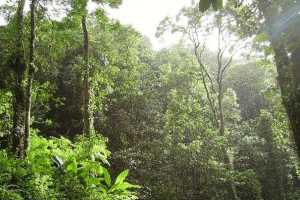Ghana developing first Biodiversity Policy to protect nature
 Ghana is developing its first Biodiversity Policy aimed at reducing threats to its over 6,000 flora and fauna to promote the sustainable utilization of biodiversity and benefits sharing to meet the people’s needs.
Ghana is developing its first Biodiversity Policy aimed at reducing threats to its over 6,000 flora and fauna to promote the sustainable utilization of biodiversity and benefits sharing to meet the people’s needs.
The draft policy, which is at the consultation stage, is in line with the post-2020 global biodiversity conservation framework, an agenda to galvanize urgent and transformative action by Governments and all of society to preserve and protect nature in the next ten years.
Dr Kwaku Afriyie, Minister of Environment, Science Technology and Innovation (MESTI), disclosed this at a national dialogue on institutional and financial mainstreaming of Biodiversity conservation in Ghana.
The day’s event, among other objectives, sought to review Ghana’s effort towards the post-2020 global biodiversity conservation framework.
It was also to take stock of the current biodiversity conservation policies and experience in using the landscape approach to conservation.
The dialogue was jointly held by MESTI, the UNDP Global Environment Facility Small Grants Programme and Weto Platform to identify areas of joint action in developing integrated approaches for the conservation, sustainable finance and mainstreaming of biodiversity in support of the Sustainable Development Goals (SDGS).
Dr Afriyie stated that biodiversity supported food security by providing raw genetic material for improved crop and livestock varieties and provided opportunities for indigenous and other communities to cultivate market niches based on traditional knowledge and livelihood practices.
He said the major drivers of biodiversity loss including, over-exploitation, pollution, invasive alien species, and climate change – have remained unaddressed.
Dr Afriyie said there was the need to reflect and recast the idea of sustainable development by marrying sustainability and biodiversity along with their relationships in more detail outlining some of the major approaches to biodiversity management and regulation.
“Our strategy should move from general principles of sustainability to concrete actions that are rooted in biodiversity conservation. Decisions about sustainability must either accommodate multiple viewpoints, values and interests or they must force some people to compromise,” he said.
He said biodiversity contributed to numerous ecosystem processes that support ecological, economic, and social wellbeing.
The Minister mentioned that biodiversity enhanced the ability of ecosystems, including heavily modified ecosystems such as those found in farms, gardens, cities, and towns to cope with climatic and environmental shocks.
Madam Angela Lusigi, UNDP Representative to Ghana, in a statement delivered on her behalf, said the COVID-19 pandemic and other emerging crises such as climate change were stark realities and a reminder of the consequences of ecological fragility and complexity.
She noted the pandemic had been devastating but the outbreaks were likely to escalate in the future unless the development pathways and humans relationship with nature were remade.
“A key takeaway from COVID-19 is that our ability to prevent complex global crises rests on our ability to put in place a new generation of development policies that put nature at the centre. Biodiversity conservation is key to our future as it contributes to the achievement of all the Sustainable Development Goals,” she said.
Referencing the UN Secretary-General António Guterres on the occasion of this year’s World Environment Day, said: “Science tells us these next 10 years are our final chance to avert a climate catastrophe, turn back the deadly tide of pollution and end species loss. So let today be the start of a new decade – one in which we finally make peace with nature and secure a better future for all.”
Madam Lusigi stated that the draft post-2020 global biodiversity framework would be the key platform to further scale up actions in the developing countries in the coming years to build the resilience of communities and ecosystems.
“This requires reducing the intensity of development’s ecological footprint to ensure the resilience of the biosphere, with healthy and diverse ecosystems,” she noted.
Dr George Ortin of UNDP Global Environmental Facility Small Grant Programme, sharing lessons from the Weto socio-ecological production, said landscape restoration must be a national priority and specific attention must be paid to the landscape approach to biodiversity conservation.
He said it must include key issues such as livelihood enterprises development, strengthening of local institutions and transparent governance systems at the heart of the country’s development efforts.
He said the incorporation of strategies to promote biodiversity conservation within socio-ecological production landscapes must be a national priority and specific attention must be paid to the landscape approach to biodiversity conservation.
Source: GNA
